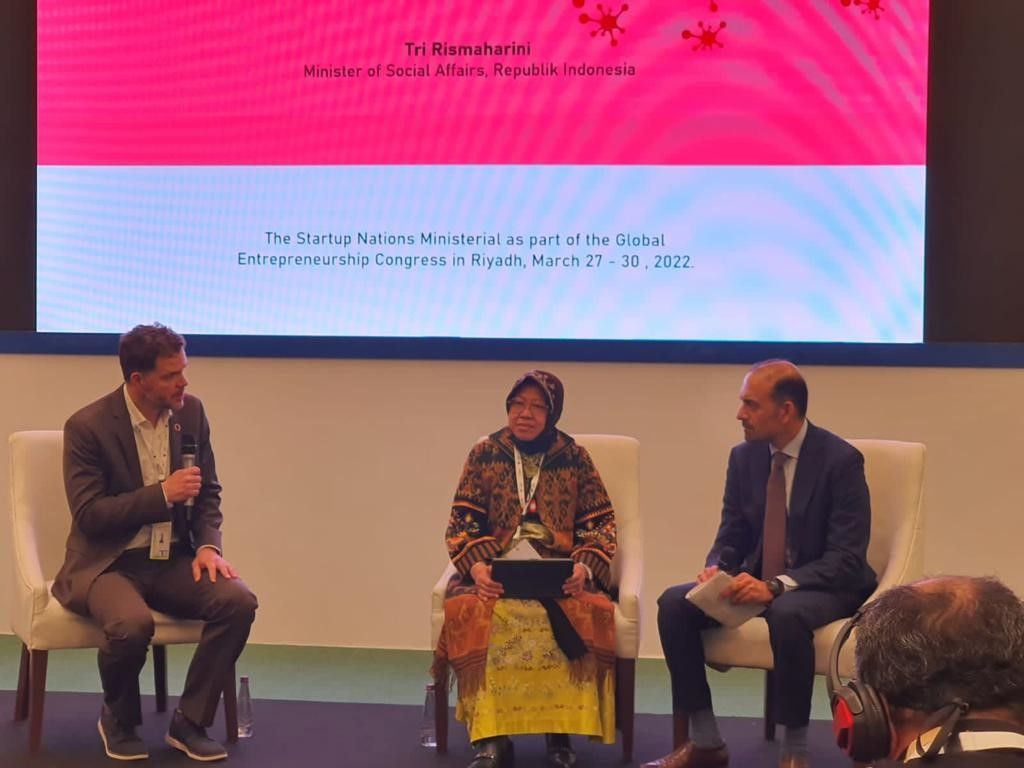Popular Reads
Top Results
Can't find what you're looking for?
View all search resultsPopular Reads
Top Results
Can't find what you're looking for?
View all search resultsCommunity empowerment programs become focus at Global Entrepreneurship Congress
During a key presentation at the Global Entrepreneurship Congress (GEC) in Riyadh, Social Affairs Minister Tri “Risma” Rismaharini showed a video of Gading Ogi Saputra, a 17-year-old with multiple disabilities.
Change text size
Gift Premium Articles
to Anyone
D
uring a key presentation at the Global Entrepreneurship Congress (GEC) in Riyadh, Social Affairs Minister Tri “Risma” Rismaharini showed a video of Gading Ogi Saputra, a 17-year-old with multiple disabilities. Using his wooden tricycle, Gading sold food and soft drinks around Pekalongan, earning up to Rp 500,000 (US$34.81) per day.
For his persistence, Gading received social rehabilitation assistance from the Social Affairs Ministry in the form of a three-wheeled motorbike. The bike increased his turnover to Rp 1 million per day and he was able to make Rp 300,000 in savings.
Gading is just one recipient of the government’s efforts to empower the poor and other vulnerable groups through its various programs. Risma explained that the government had launched an intensive social welfare program to help disenfranchised groups most affected by the pandemic.
"The program is in the form of cash social assistance for 10 million beneficiaries and basic food assistance for 18.8 million beneficiaries. In 2021, the amount of assistance was around Rp 105 trillion,” said Risma.
The Social Affairs Ministry has also prepared programs that target other groups, such as people with disabilities, the elderly and orphans. Children who lost their parents to COVID-19, for example, receive special care from the government. "For orphan children, the government has a program to support their education and daily needs," stated the minister.
For people with disabilities, the ministry provides work training at centers where they can build tools for their specific needs, such as modified wheelchairs for people with cerebral palsy and walking sticks with GPS for people with visual sensory disabilities. The ministry aims to help them move out of the poverty line while increasing their mobility and developing their potential, as was the case with Gading.
Homeless people, meanwhile, benefit from the ministry's rusunawa (low-cost apartment building) projects. They also established entrepreneurial gallery centers named the ATENSI Creation Centers in 28 of the 41 Social Affairs Ministry centers across Indonesia. The facilities display homemade products and provided stalls for tailors, salons and spas.
"It's all to help the ex-beggars, homeless and street vendors," added minister Risma.
Her policies also extend to indigenous communities. While respecting their culture, the Social Affairs Ministry has made initiatives to improve education for indigenous children, health facilities and other basic needs.
"We also support the transition to modern agriculture and fisheries, from upstream to downstream and food processing. This policy applies to the Suku Anak Dalam indigenous group from the lowland forests in Jambi, the Baduy in West Java and the Asmat in Papua," added minister Risma.
Disaster response was another focus of the Social Affairs Ministry's programs. Victims of earthquakes, storms, landslides, flash floods and volcanic eruptions now stay in modified tents to ensure that they live in strict compliance with health protocols. There are also efforts to improve the evacuees' mental health and replace their lost income and access.
"The ministry provides entrepreneurship training and working capital so that evacuees do not fall into poverty and they can become entrepreneurs," added minister Risma.
The success of the programs ultimately depended on the ministry’s data management, a tremendous feat considering the ministry had to distribute social assistance to 16,772 islands. Minister Risma explained that major changes in data management were put in place immediately after she was appointed social affairs minister in December 2020.
In early 2021, the ministry matched its Social Welfare Integrated Data (DTKS) with the Population Data under the Home Ministry’s management. The Social Affairs Ministry was then able to verify recipient data in 514 regencies and cities throughout Indonesia. "Every month data matching is carried out. Data verification is more frequent to accommodate the dynamics of demographic and geographical shifts of recipients," concluded minister Risma.










